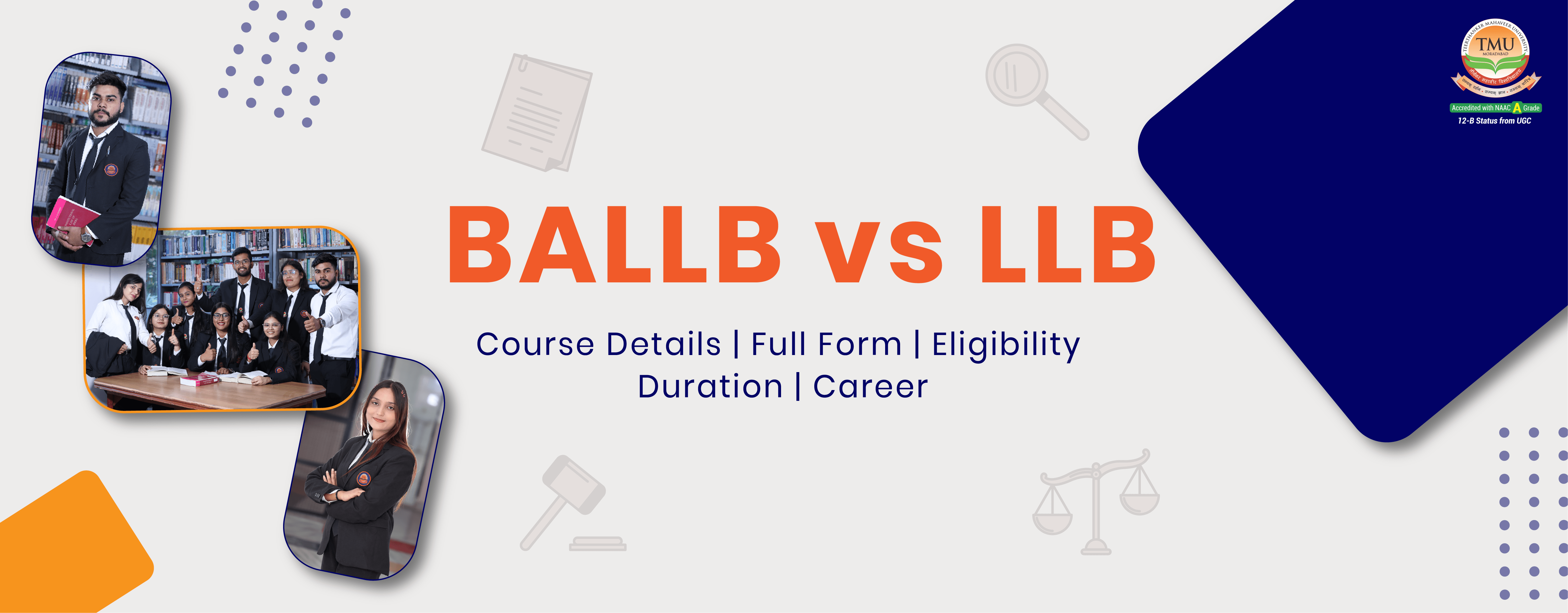LLB vs BA LLB Course Details, Full Form, Eligibility, Duration, and Career
Table of Contents
When it comes to pursuing a career in law, two of the most common choices are LL.B. (Bachelor of Laws) and B.A.-LL.B. (Bachelor of Arts + Bachelor of Laws). Both courses offer promising career paths in the field of law, but they differ in many ways. In this article, we'll delve into the details of both LLB and BA LLB to help you choose which course suits you best.
Full Form of LLB
LLB stands for Bachelor of Laws. It is an undergraduate law degree that teaches about the legal system and principles.
Teerthanker Mahaveer University
Apply for Admission
Click Here To Apply for Admission
LLB Course Details
LLB Eligibility Criteria
The eligibility criteria for LLB include:- Educational Qualifications: Candidates must have completed their undergraduate studies from a recognised educational institution.
- Minimum Percentage: Some universities may require candidates to have a minimum percentage in their qualifying examinations.
- Entrance Exams: In some cases, candidates may be required to clear an entrance examination.
LLB Course Duration
The duration of an LLB course is typically three years for graduates and five years for undergraduates. However, this may vary depending on the institution and the country in which the course is pursued.
Career Opportunities after LLB
Upon completing an LLB degree, graduates can pursue various career paths, including:- Legal Practitioner: Lawyers represent clients in legal matters, offering advice and representation in courts. They work in law firms, government agencies, or as independent practitioners.
- Corporate Lawyer: They provide legal guidance to businesses on corporate matters like mergers and contracts They ensure companies adhere to legal regulations and protect their interests.
- Public Prosecutor: Prosecutors represent the government in criminal cases, ensuring justice is served. They work in government agencies, presenting evidence, examining witnesses, and arguing cases in court.
- Legal Advisor: Legal advisors offer guidance to individuals, businesses, or organisations on legal matters. They specialise in various areas like employment law, real estate, or intellectual property.
- Judicial Services: Careers in judicial services include judges, magistrates, clerks, and court administrators. They play essential roles in administering justice, interpreting laws, and managing court proceedings.
Full Form of B.A.-LL.B.
B.A.-LL.B. stands for Bachelor of Arts + Bachelor of Laws. It is an integrated undergraduate law programme that combines the study of law with subjects from the arts stream.BA LLB Course Details
BA LLB Eligibility Criteria
The eligibility criteria for BA LLB include- Educational Qualifications: Candidates must have completed their higher secondary education (10+2) from a recognised board or institution.
- Minimum Percentage:Some universities may specify a minimum percentage requirement in the candidate's qualifying examination.
- Entrance Exams: Many institutions conduct entrance exams for admission to BA LLB programmes. These exams assess the candidate's aptitude for legal studies.
BA LLB Course Duration
The duration of a BA LLB course is typically five years. It comprises a combination of law subjects and arts subjects throughout the programme.BA LLB Fee Details
The fee structure for BA LLB courses varies from one institution to another and may depend on factors such as the reputation of the institution, facilities provided, and location.Career Opportunities after BA LLB
Graduates of the BA LLB programme have diverse career options available to them, including:- Civil Services: Graduates can pursue roles in government departments, contributing to policymaking, administration, and governance.
- udicial Clerkship: Clerks assist judges with legal research and court proceedings, gaining insights into the judicial system.
- Legal Analyst: Analysts conduct legal research and provide insights to legal practitioners, businesses, or government agencies.
- Human Resource Manager: HR managers oversee employee management and compliance with labour laws in legal firms or corporate legal departments
Comparison between LLB and BA LLB
Both LLB and BA LLB courses provide a strong foundation in law and offer promising career opportunities. However, they differ in their approach and structure. While LLB is a standalone law degree pursued after graduation, BA LLB integrates law studies with subjects from the arts stream, offering a multidisciplinary approach.Which Course is Better
The choice between LLB and BA LLB depends on individual preferences, career goals, and academic background. If you prefer a specialised focus on law and have already completed your undergraduate studies, LLB may be the ideal choice. On the other hand, if you're interested in a multidisciplinary approach that combines law with subjects from the arts stream, BA LLB could be the right fit for you.Choosing the Right Course for You
Before making a decision, consider factors such as your interests, career aspirations, and academic background. Research the curriculum, faculty, and placement opportunities offered by different institutions offering LLB and BA LLB courses. Additionally, seek guidance from career counsellors and professionals in the field to make an informed choice.Conclusion
Both LLB and BA LLB are prestigious courses that offer rewarding career opportunities in the field of law. Whether you choose LLB or BA LLB, what matters most is your passion, dedication, and commitment to excel in the legal profession. Evaluate your options carefully and embark on a journey that aligns with your goals and aspirations.
FAQs
Q1. What is the difference between LLB and BA LLB?
Ans: LLB is a standalone law degree pursued after graduation, whereas BA LLB is an integrated programme that combines law with subjects from the arts stream.
Q2. How long does it take to complete an LLB course?
Ans: The duration of an LLB course is typically three years for graduates and five years for undergraduates.
Q3. What are the career opportunities after LLB?
Ans: Graduates of LLB programmes can pursue careers as legal practitioners, corporate lawyers, public prosecutors, legal advisors, and in judicial services.
Q4. Is an entrance exam required for admission to BA LLB courses?
Ans: Some institutions may conduct entrance exams for admission to BA LLB courses, while others may consider academic performance.
Q5. Which course should I choose, LLB or BA LLB?
Ans: The choice between LLB and BA LLB depends on individual preferences, career goals, and academic background. Consider factors such as your interests, career aspirations, and the structure of the courses before making a decision.















